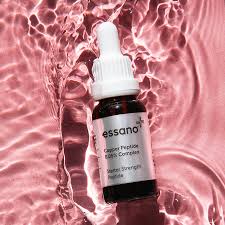
How Often Should I use Copper Peptides?
In any skincare routine, copper peptides are a fully beneficial addition. Praised as the hero ingredient of any routine, these peptides are naturally occurring in the body. When blended into skincare formulas they can target the ageing process, blemishes and combat uneven skin tone.
So, what makes copper peptides so special? The fact is copper is packed with antioxidants and anti-inflammatory properties that can help heal skin damage whilst simultaneously boosting the production of collagen. By teaming these with other effective and active ingredients you’ll find you are left with stronger, firmer, and healthier complexion. If you are wanting to find out more about copper peptides and how they work on the skin, check out our dedicated blog post “What are the benefits of copper peptides for skin?”
Can I use copper peptides every day?
Yes, you can, in fact it’s highly recommended to use copper peptides twice a day, every day. You’ll find that the formulations that are often enriched in copper peptides are serums, face oils and moisturisers. This is considered the optimal way of achieving the best results as these products remain on the skin for a longer amount of time and aren’t rinsed off, unlike cleansers and face washes. You’ll also find that other formulas, such as serums and moisturisers, all of which are often applied at the end of your routine ensure each consistency can be layered on top without having to absorb through any physical barriers caused by thick creams.
By incorporating copper peptide enriched products into your skincare routine, you are giving your skin the boost it needs to regulate and maintain the healthiest skin with minimal effect acquired from you, the peptides do all the hard work for you!
How often should I use peptides?
You can introduce peptides into your daily routine at any age, starting with your 20s right the way up to your 60s. As I have already mentioned using copper peptide products twice a day will lead to a complexion that’s repaired, hydrated and more resilient. With the skin barrier strengthened it can protect itself from environmental aggressors and free radical damage such as pollution, central heating, and exposure to UV rays.
Much like all skincare products, it is important to ensure you are using them correctly and that your skin is happy for you to apply it. If you ever have any doubts consult with a doctor, dermatologist, or medical professional.
How do you use copper peptides in routine?
Copper peptides are one of the hardest working skin ingredients with impressive multi-tasking abilities. You’ll find copper peptide extracts in such formulas as serums, moisturisers, face oils and overnight face masks. Just ensure you are layering your product the correct way, from thinnest to thickest consistency to truly reap the rewards of the different active ingredients in your skincare routine.
By incorporating them into your everyday skincare routine you can combat signs of free radical damage, scarring and post breakout redness. With copper peptides boosting the collagen production the entire process of building the skin barrier to its optimal health enabling it to repair any skin damage.
Can I use copper peptides in the morning?
Yes, you can indeed. It is generally considered a good idea to apply your copper peptide product in the morning and evening. With your morning routine application, you are providing your skin with a protective coat thanks to the antioxidant properties. This ensures it can battle against daily aggressors that encounter the skin. As for the benefits they are able to provide for the evening routine, the boost in collagen will speed up the skin repairing itself from any damage from the day.
Are copper peptides good for anti-ageing?
Yes, they are! Copper peptides are highly effective at anti-ageing. Not only are they able to effectively reduce the appearance of fine line and wrinkles on the surface of the skin. They are often considered able to deliver similar results to the potent powerhouse retinol. As impressive as the results are of copper peptides, unlike retinol they are unable to improve the skin texture meaning signs of roughness and dark spots. If you are wanting to know more about copper peptides and retinol, check out the blog post, can copper peptides replace retinol to find out more.
Do peptides actually work?
Yes, peptides are very effective at treating the skin and reversing signs of ageing, from loss of elasticity to fine lines and wrinkles. The only snag you encounter is the fact that how copper peptides work is still fairly unknown. With many studies demonstrating the benefits of peptides resulting in an all-over improved skin. The main factor that makes peptides so effective is their cell communicating abilities, that once applied topically on the skin surface can send signals to the skin cells telling them what to do.
As effective as copper peptides are at boosting collagen production and keeping the complexion at its healthiest state, it is often considered a good idea to team them with other active ingredients such as hyaluronic acid.
What should you not use peptides with?
There are a few ingredients that should not be used with peptides, such as the AHA, glycolic acid, BHA salicylic acid other potent active ingredients such as vitamin C and retinol.
Having said that, I would still recommend using these ingredients together as this will result in impressive skin results. What I mean by this is ensuring you are layering each product on the skin correctly by leaving enough time for them to absorb into the skin and bypassing any concerns with irritation or allergic reaction. You also use these ingredients in your skincare routine by alternating when you apply them to the face. Peptides for example are highly effective day time application to protect the skin surface from daily aggressors. Follow this with retinol in your evening routine for optimal anti-ageing and skin reviving results.
So, there you have a little more information about copper peptides and how often you should use them. If you have any questions about today’s blog post come and follow us over on Instagram.


